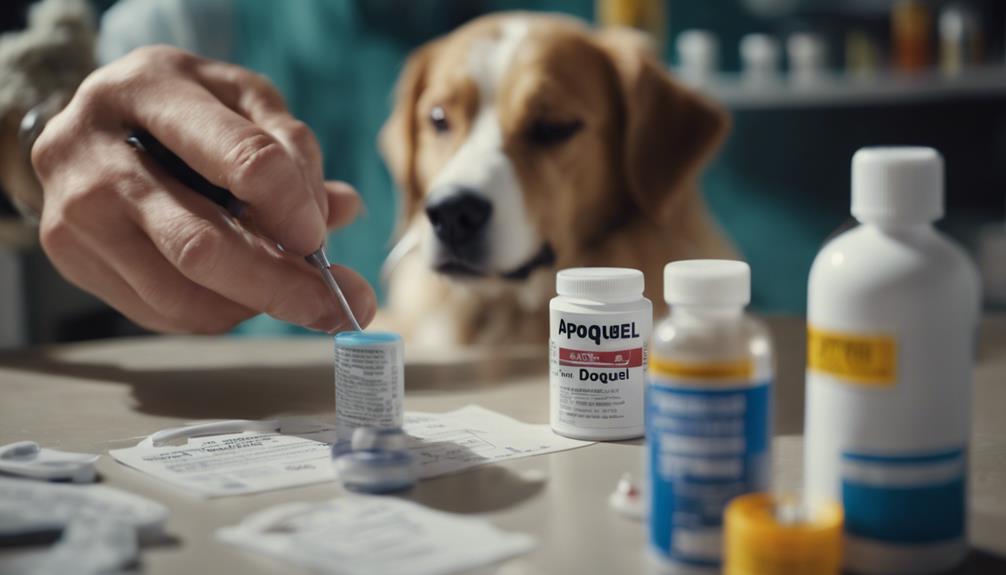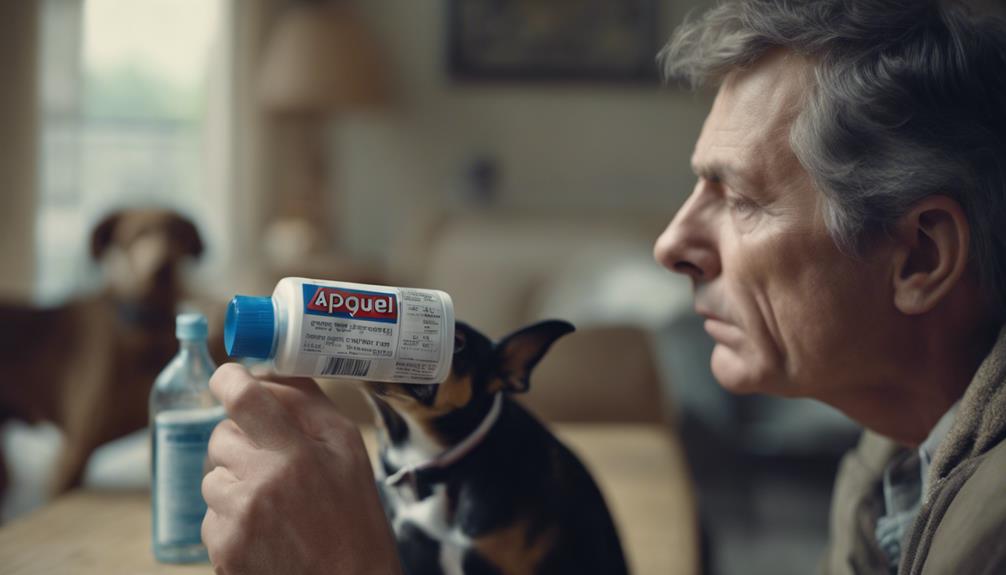The utilization of Apoquel in managing allergic dermatitis in dogs has garnered significant attention within veterinary medicine circles. As dog owners increasingly seek effective solutions for their pets' allergy-related discomfort, understanding the nuanced aspects of Apoquel becomes paramount.
From its mechanism of action to the intricacies of dosage and potential side effects, the exploration of Apoquel's multifaceted nature promises a deeper insight into the medication's role in canine allergy management.
This discussion aims to shed light on the complexities surrounding Apoquel, offering a comprehensive view that extends beyond the surface.
Key Takeaways
- Apoquel relieves itching in dogs with allergies like atopic dermatitis, acting quickly within 4-24 hours.
- Common side effects include vomiting, diarrhea, and decreased appetite, with potential risks like infections.
- Dosage ranges from 0.18 to 0.27 milligrams per pound, initially given twice daily then reduced to once daily.
- Caution is advised with certain medications, and regular monitoring by a vet is crucial for safe usage.
Apoquel: An Overview for Dog Owners
With a focus on providing essential information to dog owners, understanding Apoquel stands as a crucial step in managing canine allergic reactions and itching effectively.
Apoquel is a revolutionary medication designed to alleviate itching associated with allergies, particularly canine atopic dermatitis. As a selective Janus kinase inhibitor, it targets specific cytokines involved in allergic reactions, offering relief with minimal impact on the immune system.
Manufactured by Zoetis, Apoquel typically produces fewer side effects compared to traditional steroids and immunosuppressive drugs. Dog owners can expect relief from itching within four to 24 hours of administering Apoquel.
It is vital for pet owners to be aware of the benefits and considerations when using this medication to ensure the well-being of their furry companions.
Understanding Apoquel Uses in Dogs
Apoquel, a groundbreaking medication for dogs, is primarily utilized to alleviate itching associated with allergies, notably canine atopic dermatitis. This selective Janus kinase inhibitor, manufactured by Zoetis, targets cytokines involved in allergic reactions with minimal impact on the immune system. It typically has fewer side effects compared to steroids and immunosuppressive drugs. Apoquel can provide relief from itching within four to 24 hours of administration.
| Key Points | Description | Benefits |
|---|---|---|
| Itching Relief | Alleviates itching from allergies | Rapid relief |
| Selective Action | Targets specific cytokines | Minimizes immune impact |
| Fewer Side Effects | Compared to steroids | Safer long-term use |
Understanding Apoquel's uses in dogs showcases its effectiveness in managing allergic reactions while prioritizing the dog's overall well-being.
Exploring Apoquel's Side Effects

Exploring the side effects of Apoquel reveals potential risks associated with its usage in dogs. Common side effects of Apoquel include vomiting, diarrhea, lethargy, decreased appetite, and changes in bloodwork. Dogs may also face an increased risk of infections such as urinary tract infections, skin issues, respiratory problems, and demodectic mange.
Additionally, there is a potential risk of exacerbating existing tumors or cancer with the use of Apoquel. Gastrointestinal side effects are prevalent, but administering the medication with food may sometimes alleviate these symptoms. It is important to conduct regular blood tests to monitor blood cell production and organ function to ensure the well-being of the dog when using Apoquel.
Apoquel Dosage Guidelines for Dogs
When determining the appropriate dosage of Apoquel for dogs, veterinarians consider the dog's weight and the recommended dosage range. Apoquel is available in oral tablets of 3.6, 5.6, and 16 milligrams. The suggested dosage range is 0.18 to 0.27 milligrams per pound of the dog's weight.
Initially, it is typically administered orally twice daily for the first 14 days and then reduced to once daily. While Apoquel can be given with or without food, administering it with food may help reduce gastrointestinal side effects.
Furthermore, long-term use at maintenance doses or seasonally is feasible, providing relief to dogs suffering from itching associated with allergies.
Managing Apoquel Overdose Risks

To mitigate the risks associated with Apoquel overdose in dogs, careful storage and immediate veterinary attention are crucial. Apoquel should be kept out of reach to prevent accidental ingestion by pets.
If an overdose is suspected, contacting a veterinarian promptly is essential for appropriate guidance and intervention. Inducing vomiting may be necessary for recent overdoses, but veterinary care is often required to manage the situation effectively.
It is important for pet owners to be aware of the signs of overdose, such as excessive vomiting, diarrhea, or lethargy, and seek professional help without delay. Being proactive in preventing and addressing Apoquel overdose can help safeguard the well-being of dogs receiving this medication.
Interactions to Note With Apoquel
Understanding the potential interactions of Apoquel with other medications is crucial for ensuring the safe and effective use of this allergy-relief drug in dogs. Apoquel is generally safe when used in combination with antihistamines, antibiotics, and non-steroidal anti-inflammatory drugs (NSAIDs).
However, caution is advised when administering it alongside steroids and other immunosuppressive drugs due to the potential for enhanced immunosuppression. Combining Apoquel with such medications may increase the risk of infections or exacerbate existing health conditions.
It is important to consult with a veterinarian before using Apoquel in conjunction with other drugs to prevent adverse reactions and ensure the well-being of the dog. Regular monitoring and communication with the vet can help manage any potential interactions effectively.
Important Warnings for Apoquel Users

For dog owners considering the use of Apoquel, understanding the important warnings associated with this medication is crucial for ensuring the safety and well-being of their furry companions.
Important Warnings for Apoquel Users:
- Age Restrictions: Apoquel is intended for dogs aged 12 months and older and has not been evaluated in pregnant or nursing dogs.
- Consultation with Veterinarian: Discuss all medications and supplements with your veterinarian before starting Apoquel to avoid potential interactions or contraindications.
- Emergency Contact Information: Keep the ASPCA Animal Poison Control or Pet Poison Helpline contact information readily available in case of an overdose emergency.
Administering Apoquel Safely in Dogs
Administering Apoquel safely in dogs requires careful adherence to prescribed dosages and close monitoring for any potential side effects. It is crucial to follow the veterinarian's instructions regarding the dosage amount and frequency of administration.
Apoquel tablets are available in various strengths, and the recommended dosage range is typically 0.18 to 0.27 milligrams per pound of the dog's weight. Initially, the medication is given orally twice daily for the first 14 days, after which it is usually reduced to once daily.
While Apoquel can be administered with or without food, giving it with a meal may help mitigate gastrointestinal issues. It is important to avoid overdosing and to promptly consult a veterinarian if any concerns arise during the treatment.
Monitoring Your Dog on Apoquel

To ensure the safe and effective use of Apoquel in dogs, vigilant monitoring of your pet's response to the medication is crucial. Monitoring your dog on Apoquel involves observing for any changes in behavior, symptoms, or overall well-being that may indicate a need for adjustments in treatment.
Here are three key aspects to focus on:
- Itching and Skin Condition: Regularly assess your dog's itching levels and the condition of their skin to determine if Apoquel is effectively managing their allergy symptoms.
- Side Effects: Watch for common side effects like vomiting, diarrhea, or changes in appetite, and promptly report any concerns to your veterinarian.
- Bloodwork: Schedule periodic blood tests as recommended by your vet to monitor for any potential impacts of Apoquel on your dog's blood cell production and organ function.
Resources for Apoquel Information
When seeking reliable information on Apoquel for dogs, consulting reputable veterinary websites and publications is essential for understanding its uses and potential effects. Websites such as the American Veterinary Medical Association (AVMA), the American Animal Hospital Association (AAHA), and the FDA's Center for Veterinary Medicine can offer valuable insights on Apoquel, including indications, contraindications, and safety considerations.
Additionally, veterinary journals like the Journal of the American Veterinary Medical Association (JAVMA) and conferences such as those hosted by the American College of Veterinary Dermatology (ACVD) may provide in-depth research and expert opinions on the medication. By accessing information from these trusted sources, pet owners and veterinarians can make well-informed decisions regarding the use of Apoquel in managing canine allergies.
Conclusion
In conclusion, Apoquel offers targeted relief for dogs suffering from allergic dermatitis, with a rapid onset of action and minimal side effects compared to traditional treatments.
By following dosage guidelines, monitoring for potential risks, and heeding important warnings, dog owners can safely administer Apoquel to their canine companions.
With the right information and precautions in place, Apoquel can be a valuable tool in managing allergies and improving the quality of life for dogs.




